Life insurance serves as a crucial financial safety net, providing peace of mind and financial security to loved ones in times of need. However, amidst the complexities of tax regulations, many individuals find themselves wondering, “Do you pay taxes on life insurance?” This article by Captpromote aims to demystify the tax implications of life insurance, exploring key considerations and exceptions that policyholders and beneficiaries should understand.
Understanding Tax Treatment of Life Insurance Proceeds:
Life insurance proceeds are commonly exempt from income tax, offering beneficiaries reassurance that the death benefit they receive is typically tax-free. However, this broad assertion necessitates deeper exploration to comprehend the intricacies and exemptions outlined within the tax code. Delving into the specifics can elucidate scenarios where tax implications may arise, guiding beneficiaries and policyholders in making informed decisions regarding their life insurance coverage and financial planning strategies.

Interest and Taxable Income: Do You Pay Taxes on Life Insurance?
Although life insurance proceeds are generally not taxable, it’s crucial to note that any interest accumulated on these proceeds might be subject to income tax. Beneficiaries should ascertain whether the life insurance company disburses interest alongside the proceeds, as any interest earned could potentially elevate their tax obligations. Being aware of these nuances ensures beneficiaries can accurately assess their tax liability and make informed decisions regarding the management and utilization of their life insurance benefits.

Estate Taxes:
A critical aspect of understanding the tax implications of life insurance revolves around estate taxes. The inquiry, “Do you pay taxes on life insurance?” gains heightened importance when evaluating potential estate tax ramifications. If the deceased was the owner of the life insurance policy upon their passing, the proceeds might become part of their taxable estate. Estate tax thresholds fluctuate, necessitating beneficiaries to comprehend the consequences if the estate’s total value surpasses specific thresholds established by governmental authorities. Being cognizant of these factors empowers beneficiaries to navigate the complexities of estate taxation and make informed decisions regarding their financial planning strategies.
Inheritance Taxes:
Beyond estate taxes, beneficiaries may confront inheritance taxes on life insurance payouts in certain states. These taxes are levied by individual states and exhibit variability concerning rates and exemptions. Residents of states with inheritance taxes should acquaint themselves with the precise regulations dictating the taxation of life insurance benefits to preempt any unforeseen tax obligations. Familiarizing oneself with these intricacies empowers beneficiaries to navigate the potential tax implications associated with life insurance proceeds effectively, thereby ensuring comprehensive financial planning and minimizing any tax-related surprises in the aftermath of a loved one’s passing.

Surrendering the Policy:
An additional dimension that prompts inquiry into the tax implications of life insurance emerges when policyholders contemplate surrendering their policy for its cash value. Although the initial death benefit is typically tax-exempt, any profits obtained from surrendering the policy that surpass the premiums paid may be susceptible to income tax. Policyholders are advised to meticulously assess the potential tax ramifications before determining whether to surrender their life insurance policy. By conducting a thorough evaluation of the tax implications, policyholders can make informed decisions aligned with their financial objectives and mitigate any unforeseen tax burdens associated with surrendering their life insurance coverage.
Transfer for Value Rule:
Navigating the complexities of tax legislation introduces an additional layer of intricacy with the Transfer for Value Rule. According to this provision, if a life insurance policy is transferred for valuable consideration, such as selling it to another party, the proceeds may become partially taxable. This scenario accentuates the significance of comprehending the tax ramifications linked to any alterations or transfers involving life insurance policies. Being well-informed about the Transfer for Value Rule empowers policyholders to make sound decisions regarding the management and disposition of their life insurance coverage, thereby ensuring they can navigate potential tax liabilities effectively and optimize their financial planning strategies.
Consulting Tax Professionals:
Due to the intricate and multifaceted nature of tax regulations, coupled with the unique financial circumstances of individuals, it is strongly advisable to seek guidance from tax professionals or financial advisors. These seasoned experts possess the acumen and knowledge necessary to navigate the complexities of tax law effectively. By leveraging their expertise, individuals can receive tailored guidance and advice tailored to their specific concerns regarding life insurance and taxation. This proactive approach ensures that individuals can make informed decisions aligned with their financial goals while minimizing potential tax liabilities and optimizing their overall financial planning strategies.
Conclusion:
In conclusion, the question, “Do you pay taxes on life insurance?” underscores the importance of understanding the nuances and exceptions within the tax code. While life insurance proceeds are generally not subject to income tax, various factors such as interest, estate taxes, inheritance taxes, surrendering policies, and the Transfer for Value Rule can impact the tax treatment of life insurance. By staying informed and seeking guidance from tax professionals, policyholders and beneficiaries can navigate the tax landscape of life insurance with confidence and clarity.





